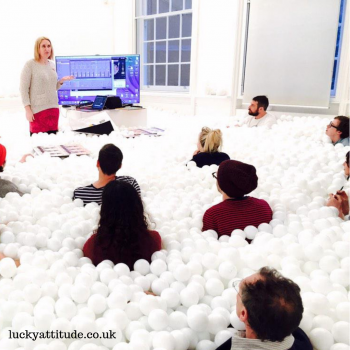Top 10 Workplace Perks Millennials Actually Want

Millennials are now coming straight out of education and into high demand in the digital and tech sector.
They are in the driver’s seat and because of that – many are opting for self-employment over a salaried job.
Self-employment seems like the best way to satisfy their needs for flexible working, rapid growth and good pay.
The overwhelming majority (94%) of freelancers in the UK would rather be self-employed than a waged employee.
It’s not surprising, that majority of the Millennials – the most entrepreneurial generation in Western history – find freelancing an attractive and lucrative career choice.
So, what can you offer to your best employees, to make them want to stay with you instead of going solo?
Let’s have a look at the top 10 common workplace expectations and perks Millennials actually want …
1. New jobs and assignments every 1-2 years
Millennials won’t wait for 3-5 years for promotion, it’s a waste of our talent and drive.
Once a job is learned inside out, it’s time for somebody else to take it over.
There is economic pressure for companies to flatten because layers of hierarchy and middle management are progression killer.
To be able to progress and grow in your career quicker, organisations must build “corporate ‘lattices” rather than corporate ladders.
Lattices mean you can move and progress around the company both horizontally and vertically, continually adding to our skills in a way that suits you.
Lattices allow for more diversity and excitement.
Millennials hate stagnation and boredom is the no 1 reason for job-hopping.
2. Offer perks
Millennials value experiences over cash.
Look for perks that your people will love & appreciate. Maybe it’s monthly massages? Or health insurance? Or discounts on brands and services like Deliveroo and Airbnb?
It can also just be small things like:
• Bring in surprise snacks
Bringing in a surprise pack of doughnuts or some cupcakes can help to literally sweeten up your employees’ day. During stressful work periods, snacks could help to provide the morale boost that your employees need.
• Schedule monthly lunches out
You could also try taking your employees out for lunch somewhere once per month. Getting out of the office can help to provide an exciting change of environment. It could also be a chance to get everyone to socialise together and improve camaraderie. Considering that your staff team isn’t too big, consider paying for their meals so it truly feels like a reward.
• Buy small Xmas and birthday gifts
When it comes to special occasions, you could consider showing your appreciation by buying small gifts for your staff. You could try gift boxes such as these Happyswag Christmas gifts in 2022. They could be placed on everyone’s desks in the morning as a fun surprise.
There is a range of employee discount schemes UK that you can find, which can give you some ideas.
• Offer vouchers and discounts for work-related equipment
This can be anything from £200 towards an ergonomic chair or £100 towards comfortable nursing shoes online at Uniform Advantage, for instance.
Nursing shoes are the most comfortable type of shoes meant for people who work on their feet long hours. Because of its extra ventilation, hospital shoes help minimise the buildup of heat, moisture, and bad odor around your feet.
3. Flexible work scheduling
Many jobs such as teaching English online with a UK TEFL course can be worked remotely. Consider allowing employees the option to work from home if they desire. This can cut out commuting and allow employees more time to spend with family. It could also save you money and possibly lead to better. productivity.
Sometimes, I’d want to take a Friday off here and there or leave a little early when the mood strikes as opposed to taking an entire week off at a time.
The result of this type of mentality?
Projects are seldom delayed and time in the office is spent working – not wishing they were out of the office doing something else.
Working mindset is changing from “managing by seeing” to “managing by results”, so it shouldn’t really matter when and how long it takes to do the job, as long as it’s done on time.
Millennials don’t want their work to be a school for grown-ups, with all the unnecessary rules like set working hours.
We seek a more results-oriented work, in which productivity counts for more than doggedly sticking to conventional office hours and regulations.
There are many different types of flexible working that every employee (not just working mothers) are entitled to request in the UK since 2014.
Here is the overview of them all:
Job sharing: This usually means two people being employed in the same role and job and splitting the hours.
Working from home: This is when the employee does some (or all) of the work from home or anywhere else other than the normal place of work.
Part-time: This refers to any arrangement involving working less than full-time hours (usually by working fewer days).
Compressed hours: This means working full-time hours but over fewer days than normal.
Flexitime: The employee chooses when to start and end work (within agreed limits). Usually, the employee will have previously agreed ‘core hours’.
Annualised hours: The employee is required to undertake a certain number of hours over the year but they have some flexibility about when they work.
Staggered hours: The employee has different start, finish and break times from other workers.
Phased retirement: Now that the previous default retirement age has been phased out, older workers have more choice over their employment. This means that they might reduce their hours or work part-time.
Research suggests that having the opportunity to organise work demands around the natural body rhythm may produce positive results in tasks such as resolving conflicts and thinking creatively.
Flexible working employees are not just happier but also healthier.
4. Unlimited holidays
Many companies are still hesitant about this one, but the results may pleasantly surprise you.
Employees work more efficiently knowing they can tackle personal challenges that appear throughout the year and do not need to worry about requesting subsequent time off.
Companies that offer unlimited holidays and flexible work schedules are doing more than offering cool perks. They are telling their employees, “We trust you.”
In turn, young employees are more likely to act like responsible adults – often putting in more hours than is expected of them.
5. Consider a bring-your-dogs-to-work day
There’s a lot of research about how pets make us happier.
And the UK is a pet-loving nation, with almost half of us (45%) own a pet.
And in the ongoing war to attract millennial talent, the companies that make it easier for pet owners to care for their fur babies are likely to win.
Today, thousands of companies offer pet insurance as an employee benefit, including Ikea and Microsoft.
A bring-your-dogs-to-work day could be a fun way to allow employees to spend time with their dogs.
6. Introduce employee awards
You can help to motivate and reward employees by also introducing employee recognition awards. This could be a weekly or monthly award, or a selection of annual awards.
You could reward hard-working employees with more time off, for example.
7. Inspire with colourful & fun office interior
Coming into an office that looks and feels inspiring and engaging is something that Millennials are increasingly not just seeking, but expecting.
We don’t want to feel like a cog in a wheel of a soulless machine, we want to feel part of a unique organisation with its own identity, character and a splash of colour.
We also want a variety of work-stations for collaborative and individual work.
An office should accommodate for collaboration, and not be a place, where we just come together to stare at our computers.
I see an office becoming a collaboration hub, where employees can meet around the sofa or a round table facing each other to connect, brainstorm and plan; whereas individual work is done behind the desk, or outside the office altogether.
You can do pretty much anything with your office interior apart from building a meditation hub in front of a fire exit 🙂
It’s safe to speak to companies like Analogue Electrics before rearranging the whole office space. They can help with understating the regulations about fire alarm locations, design and installations.
8. Food, food, food
No wonder free breakfasts, lunches, and healthy snacks are the top perks offered by the companies.
We do not just love to eat, we also need to eat (we get hungry).
It’s a basic need, that everyone loves.
Catering lunches give employees freedom from worrying about what they are going to eat every day and having to pack a lunch.
Providing free, healthy options also encourages employee wellness.
Just remember that providing food to employees requires some additional expenses and careful consideration of regulations. For instance, food in containers must be sealed properly to prevent contamination. One way to achieve this is by using plastic sheets to cover the containers. These plastic sheets from Cut Plastic Sheeting are perfect for the job.
9. Paid fitness memberships
For a fitness junkie like me, this one is a real treat!
A healthy employee is a happy employee – and happy employees get the job done.
Millennials are one of the most health-conscious generations, so wellness packages will really be appreciated.
10. Direct access to leadership regardless of their titles
We don’t view managers as experts, because we know where to find multiple versions of the information.
Instead, we view managers more as coaches and mentors and we want to be able to speak to them without barriers.
Millennials now want open, fun and inclusive leadership styles; and they thrive on fairness and performance-based appraisals, not tenure and seniority.
We would prefer to have access to a number of other leaders, rather than be limited to working with one leader or manager.
We are very open to the prospect of reaching out to supervisors, for example, to say:
“Here’s a way I would like you to behave that would help me be a better employee for you. I need weekly meetings, I need feedback more often, I need an example of a project you’ve liked before so I can emulate it, I need mentorship…”
Summary
Millennials are driven by purpose, contribution, and control of their own work.
The best way to convince Millennials to consider your company as a long term investment is to ensure their voices are heard.
The Talent War is on! What new attitudes, values and approaches are you going to introduce in your organisation to keep and attract the best people?



